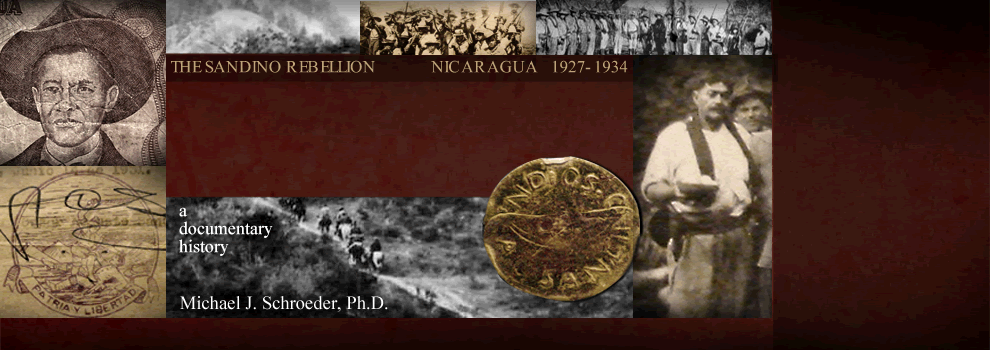|
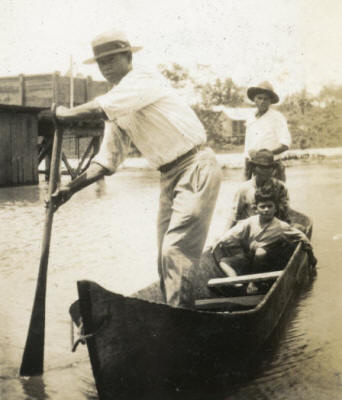 THIS IS THE EIGHth PAGE
of documents for the first HALF of 1928
on Nicaragua's Caribbean Coast region, housing
materials dated during the month of June.
THIS IS THE EIGHth PAGE
of documents for the first HALF of 1928
on Nicaragua's Caribbean Coast region, housing
materials dated during the month of June.
The page opens with
Major Utley's perspicacious 5-page
"Estimate of the Situation and Plan"
(1 June) summarizing how the Marines see the military
situation & their various options,
which can be fruitfully
read alongside his 14 June "Resume
of the Situation". We also
glimpse some of the brutality of the
counterinsurgency campaign, for
instance in Cpl. Cole's June 3
radiogram from La Luz describing the
shooting of two "bandits ... trying
to escape after capture," both of
whom "refused to talk." The
rough-and-ready racial-ethnic
categories being imposed by the invading
Marines also appear in the
interstices of various reports, e.g.
Capt. Tebbs' June 13 description
of a "trusted scout" as a "Spic"
(presumably a racial epithet for
"Spanish" or Western Nicaraguan).
More details
continue to emerge about the EDSN raid on the
mining districts, as in the official
report of the police commissioner in
Siuna (in the June 14 message from
Jefe Político Juan J. Estrada) &
the June 18 message from Lt. Hall.
Meanwhile Capt. Edson continues to write
his family members long & lovingly
detailed letters, like his 5-page
June 11 missive to his mother. There's a lot here.
|
|
PERIOD MAPS
|
|
1894 mosquito
shore

27 MB,
library of congress
|
1920s
Standard Fruit

6.5 mb,
US National archives
|
1928 Rio wanks
Patrol

3 mb, us
national archives
|
1931 Moravian

2.4 mb,
coMENius press
|
|
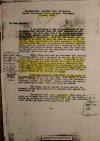
|
1.
1 June 1928.
"Estimate of the Situation and Plan,"
Major H. H. Utley, Puerto Cabezas, to
Gen. Feland, Managua, p. 1.
"My dear General:
¶ I am enclosing a copy of my estimate
of the situation and detailed plan for
your information and criticism. You will
note that I do not discuss plans open to
me except insofar as my action to meet
each bandit plan is concerned. This for
the reason that my mission is so clear
to deny the bandits territory, recruits,
arms, ammunition and other supplies, to
protect American interests, and to
destroy the bandits wherever found, that
it appears to be more a question of how
to forestall all possible bandit plans,
than the selection of one line of action
on the supposition that they will
definitely adopt any one plan. ¶ While
Floyd was here we discussed the question
of holding BOCAY, and I gathered he was
not fully convinced of the necessity of
doing so. I dislike to give up territory
once occupied unless the supply
situation compels. BOCAY appears to have
been a rendezvous and supply point for
the bandits and a withdrawal will have a
bad effect. Tebbs’ mistaken withdrawal
from TUNKY had a bad effect locally and
left the way open for the subsequent
return of the bandits to LA LUZ. ¶ I am
not convinced that BOCAY is the limit of
my activities. The first good day, after
BOCAY is occupied, I intend to fly out
and confer with the Captains – Linscott,
Walker, and Edson – there; observe for
myself the condition of their men; and
issue my orders. ¶ The rainy season
appears to have set in, in earnest,
which will handicap us somewhat but
should not immobilize us. ¶ The planes
have been a godsend. They have enabled
me to make personal reconnaissance of
the terrain, locate my patrols and
communicate with them, and increase
their morale by furnishing cigarettes,
etc . . . "
|
|
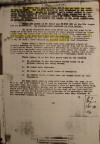
|
2.
1 June 1928.
"Estimate of the Situation and Plan,"
Major H. H. Utley, Puerto Cabezas, to
Gen. Feland, Managua, p. 2.
" . . . My forces
will shortly reach BOCAY and now hold
the WANKS as far as LAKUS. The bandits
appear to have withdrawn to the
southwest of that place. La Luz is
occupied and a combat patrol is
operating to the southwest of that
point. The rainy season has set in,
which renders forth our operations
except by river, increasingly difficult.
Periodically it renders the supply of
the ports established or proposed
easier. ¶ There are posts at El GALLO
and GRANDE BAR on the Rio Grande and at
BLUEFIELDS. No bandits have appeared in
this sector. ¶ My first estimates were
that BOCAY was too far away to be
supplied from here and that to occupy it
would unduly extend my lines. Since then
the rains have commenced and my forces
been augmented. I now believe I can hold
BOCAY and keep it supplied. To what
extent I can operate further up the
WANKS and BOCAY Rivers is problematical.
It may be that I have reached my elastic
limit in that direction. ¶ Since about 1
March there have been constant rumors of
trouble brewing in Honduras. The times
set varied from May to October. A
revolution there, whether outwardly
friendly to Sandino or not would
necessitate increased watchfulness on
our part along the border. This
situation is being watched as closely as
possible, mainly through unofficial
agents who are friendly to Americans in
Nicaragua, known to me. ¶ There appear
to be but four plans open to the
bandits. ¶ a. To withdraw to the
southwest beyond reach of my patrols
during the rainy season. ¶ b. To cross
into Honduras. ¶ c. To break up into
small bands of marauders. ¶ d. To strike
south, either down the Grande River or
into Chontales. ¶ If they adopt plan a,
they will come within the zone of action
of the 11th Regiment and I must be
prepared to prevent their coming back
into this area. This requires a line of
garrisoned posts with active patrolling
between posts, and to the westward. If
the bandits adopt this plan they may be
expected to run foul of the 11th
Regiment patrols. So far as my reaction
is concerned it is immaterial whether
the bandits continue active or remain
passive when they withdraw to the
southwest beyond my reach . . . "
|
|
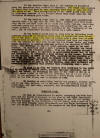
|
3.
1 June 1928.
"Estimate of the Situation and Plan,"
Major H. H. Utley, Puerto Cabezas, to
Gen. Feland, Managua, p. 3.
" . . . If the
bandits adopt plan b, its success is
dependent upon the reception they
receive in Honduras. The WANKS then
becomes my front line and must be more
strongly held than if they are west and
south of me. This strengthening of the
WANKS posts will still be necessary
however if the bandits adopt some other
plan but the Honduran situation gets
worse. ¶ If the bandits adopt plan c,
they will give considerable trouble over
a large area for some time. However this
will probably follow the same lines as
in Haiti and Santo Domingo, requiring
numerous posts and constant patrolling,
but permitting the use of weaker
patrols. This plan would probably be the
‘beginning of the end’, and is
considered unlikely except as a last
resort. ¶ If the bandits adopt plan d,
they will be following their previous
practice of shifting their zone of
operations when driven out of one zone.
They will also be moving into a zone
that is more lightly held at present. It
is not believed that they are familiar
with the terrain in this zone except the
Rio Grande basin, and their known
objection to leaving home may prevent
the adoption of this plan. Its advantage
is that it would probably cause us the
most trouble. To forestall such a move I
propose to transfer the Tulsa Detachment
to the Southern Sector. With one full
company already there I will be able, in
addition to garrisoning Grande Bar, El
Gallo and Bluefields, to establish a
post further up the Grande, probably in
the vicinity of QEUPI on the TUMA,
possibly in the vicinity of SAN PEDRO
del MORTES, and place an outpost at or
above RAMA. This tends to straighten out
my line, does not over extend, and will
render the adoption of plan d, by the
bandits, much more difficult of
execution and probably will prevent them
attempting such a move. ¶ My plan is to
deny the bandits free territory to the
limit of my ability to supply posts,
protect American interests, and to guard
the border, by occupying the line of the
Wanks as far up as BOCAY; place a post
in the PIS PIS District; and at LA LUZ
with a post to the westward on the
MATAGALPA-WUANI Trail; place a post well
up the TUMA River; and an outpost at
RAMA. ¶ By keeping up patrolling (aerial
and ground), between posts, and in the
area covered, it is believed that the
mission can be accomplished, and
territory, supplies, and re-enforcements
denied to the bandits. ¶ DETAILED PLAN.
¶ To make my dispositions in depth,
assigning the 59th Company and the
Denver Detachment to the line of the
WANKS (exclusive of CAPE GRACIAS); the
Galveston Detachment to the PIS PIS
Section; the 60th Company to the
MATAGALPA – LA LUZ Trail, with a post at
LA LUZ; the 61st Company (less
detachment) and the Tulsa Detachment to
the RIO GRANDE and ESCONDIDO; the
surplus of the 51st Company to . . . "
|
|
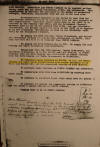
|
4.
1 June 1928.
"Estimate of the Situation and Plan,"
Major H. H. Utley,
Puerto Cabezas, to
Gen. Feland, Managua, p. 4.
" . . . CAPE
GRACIAS, BLUEFIELDS and PUERTO CABEZAS
to be regarded as Rear Areas, where men
can obtain recreation, refit, and
recuperate. Each organization to
maintain the garrisons in its sector at
prescribed strength, furnishing
replacement from the men in the rear
area. ¶ Re-enforcements required in any
sector to come from the organization
concerned to be furnished from the rear
elements of that organization. This will
permit operations on the WANKS to be
westward from LA LUZ by one company (the
60th), and one detachment (Galveston);
and further permit the force on the
WANKS to be augmented by one detachment
(Galveston) or that on the
MATAGALPA-WAUNI Trail by one detachment
(Denver). ¶ To supply the 59th Company,
Denver Detachment, and Galveston
Detachment through the supply dump
established at WASPUC, this dump and
CAPE GRACIAS to be supplied from PUERTO
CABEZAS. ¶ To supply the 60th Company
via LA LUZ. To supply the 51st Company
and Tulsa Detachment from BLUEFIELDS. ¶
Evacuation from the 59th Company, Denver
Detachment, and Galveston Detachment, to
be via WASPUC and CAPE GRACIAS, to
PUERTO CABEZAS; from the 60th Company
via PRINZAPOLKA to PUERTO CABEZAS; from
the 51st Company and Tulsa Detachments
to BLUEFIELDS. ¶ To establish radio
stations at WASPUC, LA LUZ, and BOCAY,
utilize the commercial installations
with marine personnel at El GALLO and
GRANDE BAR, and the commercial station
at CAPE GRACIAS. ¶ To maintain radio
stations at PUERTO CABEZAS and
BLUEFIELDS. ¶ To communicate with RAMA
from BLUEFIELDS by existing telephone
lines. ¶ To continue to construct light
field radio sets for patrol use. ¶ To
consider as reserve the commercial
station at BLUEFIELDS and the Lumber
Company station at PUERTO CABEZAS. ¶
Command Post to be at PUERTO CABEZAS. ¶
[Handwritten note at bottom of page] –
Dear Oliver:- ¶ I sent a copy of this to
the General by regular mail and am
holding this in the air mail on the off
chance something comes over. It will
probably be obsolete before it reaches
you. Notwithstanding appearances I do
not consider my plan a straddle. HHU"
|
|
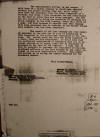
|
5.
1 June 1928.
"Estimate of the Situation and Plan,"
Major H. H. Utley, Puerto Cabezas, to
Gen. Feland, Managua, p. 5.
" . . . The
replacements arrived in due course. I
hold them as a casual company to
facilitate administration and permit
sorting them out, until today. I have
kept the transfers from the other
companies at a minimum, but those I have
requested are men experienced in the
work to which they are being assigned.
The few men not required to bring the
companies to strength are being assigned
to the 51st Company, which will serve as
a pool, and also because it appears that
this company will lose personnel due to
transfer to the United States more
rapidly than the other companies. ¶ The
morale of the 51st Company has been
lowered somewhat in the past due to lack
of promotions to fill vacancies in the
authorized compliment of the company.
The reason given was that the fifth
regiment, as a whole, then had its
complement. It would seem that the
authorized complements of companies that
are on detached service so to speak,
ought not be decreased by averages in
the rest of the regiment. I hope that it
will be possible to increase the
complement of non-commissioned officers
of the 51st Company by the number
assigned to the Area Headquarters
Platoon. This number was arrived at by
adding the number selected for the
necessary duties. ¶ Very respectfully, ¶
HAROLD H. UTLEY, ¶ Major, U.S. Marine
Corps, ¶ Commander, Eastern Area."
|
|
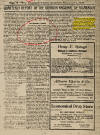
|
2 June 1928.
The Bluefields
Weekly, "Quarterly Report of the Guardia
Nacional de Nicaragua."
"Through the
courtesy of Major Sage, head of the
National Guard of this section of the
country, we have been favored with a
copy of the first quarterly report of
the organization in Nicaragua. ¶ It is
indeed a comprehensive information of
the activities and deportment of the men
comprising this most valuable
institution and of the benefits already
derived by the Nation from it. ¶ A
complete account of all the engagements
in which the National Guard took part in
pursuing Sandino since the beginning of
this year to March 31, is given. Some of
the exploits being equal in daring to
those read of in the Mexican trouble
with the famous Pancho Villa. ¶ It is
distressing to note that among the
various information of valor and
sacrifice the report brings also this
one of treason, in the Somotillo attack,
January 8: ¶ 'The following nine
enlisted men of the Guardia stationed at
Somotillo mutinied against their loyal
comrades and joined the bandits in the
attack against the barracks and innocent
townspeople. ¶ The sorrow of all
honorable Nicaraugans accompany these
unfortunate men in their lives of
misfortune. These cowardly men can never
escape from the fact that they
voluntarily enlisted in the Guardia
Nacional and of their own free will took
its oath of loyalty to that
organization. They will always remember
that when their comrades and their
country needed them, they turned
traitors and joined the enemy in
spreading death and destruction to a
peaceful little community. ¶ The
knowledge that through treachery, their
loving families and trusting friends
have suffered shame and humiliation will
remain with them until they are laid
away in the ignoble graves that await
them and which several have already
[---ed]. ¶ Nicaragua rememers the
following named men as traitors to their
country, their comrades and their
families: ¶ Corporal Manuel Chaverry ¶
Private Miguel Centeno ¶ Private Manuel
Matute ¶ Private Luis Valle ¶ Private
Luis Peralta ¶ Private Ramiro Noguera ¶
Private Juan Nota[ime] ¶ The following
named members of the Guardia were
commended for acts of valor in
connection with this engagement. Their
devotion to duty and heroism in this
desperate [shootout] has won the
admiration of the entire [Coast and
Nation] ¶ Cadet George H. Adams, G.N.¶
Cadet [Roy A. Nesmerelda], G.N. ¶
Private Francisco Espinoza, N. 69, G.N.
¶ Private Adrian Zavala N. 131, G.N. ¶
Private Jose Zapata, N. 253, G.N. ¶
Private Casimiro Paredes, N. [21], G.N.
¶ Referring to the capture of arms of
differenty types and class, during the
period [11-20] February, the report
says: ¶ 'The Government of Nicaragua has
insured law, controlling the [illegible]
¶ The Guardia Nacional is going to do
everything within its power to support
the Government of Nicaragua in having
the laws obeyed. Only by this course can
we hope to make this country a place
where the honest, law abiding citizens
can enjoy peace and happiness. ¶
Two Notorious Criminals ¶ 'On
18 February, 1928 a Guardia Nacional and
U.S. Marine Corps Patrol commanded by
Captain Lewis B. Reagan, U.S.M.C. (Cadet
Joseph L. Blanchard, G.N. commanded the
Guardia troops), visited Las Manos,
Nueva Segovia, Nicaragua, and received
the following Nicaraguan outlaws who
were turned over to the Guardia Nacional
by the Honduran authorities: ¶ Anastacio
Hernandez, Bandit Leader. Jose F.
Torres, Bandit Jefe.' ¶ 'Notes
on Las Manos Patrol: ¶
Hernandez was the leader of the
Hernandez Band of outlaws that committed
horrible murders and other cxrimes in
Northern Nicaragua during the past
several months. Torres was his first
chief. Hernandez and Torres are confined
in the prison in Ocotal. ¶ The entire
Guardia Nacional appreciates the capture
of these two notorious criminals by the
Honduran authorities and will always do
everything within their power to assist
Honduras in maintaining law and order
along the Honduras-Nicaraguan Border.' ¶
Guardia Nacional Takes Over City
Police Duties of Managua ¶ On
16 March, 1928, the Third Company of the
Guardia Nacional took over the city
police duties of the city of Managua.
Colonel Archibald Young, G.N. was
appointed chief of Police of Managua
City and made the initial organization
of the police activities of the city.
The Third Company is quartered at the
Momotombo Grounds in the former National
Museum.' ¶ Speaking of the marksmanship
of members of the Guardia the report has
the following: ¶ 'It has been
demonstrated on the Managua range that
many of the Guard are natural rifle
shots, and iwth careful schooling and
attention to details these men can be
developed into 'Expert Riflemen.' The
high score of the Guardia to date is:
Raso Ernesto M. Martinez, No. 645, G.N.,
sore [221] points. Martinez next of kin
is his mother, Regina Medina, of
Chinandega. ¶ During the above period
fifty-five Guardia on duty as Prison
Guards qualified in shooting the
Winchester Riot Shotgun on the Managua
Range.' ¶ On March 31, 1928, the Jefe
Director of the Guardia Nacional
addressed the following message to all
members of the Guardia Nacional de
Nicaragua, ¶ 'As the Guardia Nacional
extends its work throughout the Republic
it appears from time to time that
certain public officials have the
impression that the Guardia Nacional is
not a part of the Government but is a
force outside of the Government which is
seeking to censure the officials. This
is not a fact. ¶ The Guardia Nacional is
endeavoring to inforce the laws of the
Republic regardless of party feeling. In
this endeavor the Guardia has been
charged by one member of the party or
another with belonging to the other
side. THe Guardia has been charged with
persecuting members of an opposite
party. ¶ The Guardia investigates all
such charges that are brought to its
attention. None of them, as yet, have
been proved by the evidence obtainable.
¶ It should be clear to the officers of
the Guardia, however, that in a country
where the National Police Force can be
often used for party purposes in
preferences to a joint enforcement of
laws there will be many who will believe
that the Guaardia is operating along
these lines of party feeling. ¶ It
therefore behooves all officers and men
of the Guardia to exercise the strictest
adherence to justice, to enforce the
laws without undue force. If the Guardia
persists in this policy, it will
eventually obtain and maintain the
respect and good will of the people of
Nicaragua. ¶ The Guardia Nacional de
Nicaragua belongs to the people of
Nicaragua and is a part of their
Government. It is not operating
independently of the Government but it
is operating with a consistent endeavor
to act with justice within the
limitations of its powers. It does not
belong to any party.' ¶ Finally, the
report concludes with a list of the
various members of the Guardia who
obtained promotion for their acts of
bravery and dedication to duty during
the several engagements in which they
took part, since the campaign against
Sandino started. ¶ The report is
interesting in every detail."
|
|
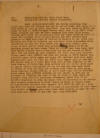
|
2 June 1928.
Radiogram from
Capt. Cook, Kalasanka, 5
hours from Bocay, to Major H. H. Utley,
Puerto Cabezas.
"8602 Arrived
KALASANAKA ten thirty yesterday stop
trail ends here but believe one can be
cut in three days comma it is five hours
by boat to BOCAY stop trail from here
taken by JIRON supposed to lead to
JINOTEGA with branch trail from it to
WANKS river comma distance and time to
cover unknown stop when JIRON passed
through here there was an American with
him comma probably MARSHALL comma who
appeared to be in good health and well
treated stop presence in band explained
to marines by bandits by the story that
American had wife in interior and was
under their protection while travelling
to join her stop JIRON left some pack
animals here which we will corral today
stop several empty shells PA 27
ammunition picked up here comma fired by
JIRON’s band stop rumor here that MARCOS
AGUERRO died eleven days ago and was
buried in BOCAY comma his men going up
into interior via WANKS stop also
contradictory rumor that AGUERRO and
band are coming to BOCAY Sunday stop
LINSCOTT comma EDSON comma and eight (8)
enlisted left zero seven hundred this
date via boat for BOCAY stop rumors will
be verified and report made at a later
date stop this patrol expected to return
evening of third June stop patrols are
out in all directions to locate trails
stop patrols of six (6) men out over
back trail to BODEGA DE KULI to bring
two bateaux down river to this place
colon expected return evening of third
June stop CAPTAIN LINSCOTT heard rumor
that SANDINO ordered all his chiefs to
meet him in province of JINOTEGA the
last of May or first of June comma not
verified stop LINSCOTT considers
abandoning mules stop it is EDSON’s
intention to keep all mules even if
necessary to cut trails stop request
permission to wave either on BOCAY or
follow JIRON as information dictates
stop suggest that BOCAY be used as a
base and five (5) months supplies or as
much as practicable be sent there stop
health of troops good stop three days
rations on hand but will make these last
weeks or ten (10 days stop COOK 0900"
|
|
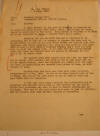
|
3 June 1928.
Radiogram from Corporal George Cole,
Commanding Officer, La
Luz Mines, to Major H. H. Utley, Puerto
Cabezas.
"A rebel General
by the name of Arroliga is reported to
be about two hours hiking above Wani,
which, considering the trail, should be
about four to six miles. This report is
believed to be true as it was furnished
by Wing, a chinese here, and a guide. ¶
Arroliga has six men with him and is
reported to be recruiting men to join
him in attempt to capture the base here
at La Luz mines, as soon as the pack
train leaves for Captain Rose with
supplies, word being furnished that only
two men would be left here. This is true
as only Gunnery Sergeant Conwill and a
cook was left here to guard the supply
base. I was left here by Captain Howard
after crash and whoever made the report
to Arroliga did not know I was to remain
here. ¶ Two bandits have been killed
here the last ten days trying to escape
after capture, one here at the La Luz
mines and one at the Ampaco Bodego,
where the supplies are landed from the
boats for here, no information was
secured from either of them, as both
refused to talk. ¶ Captain Rose has been
away from here since midnight,
twenty-second of May, 1928. As far as we
know Captain Rose is now at Hiyas, this
being the town where he was at when he
sent his pack train back for supplies. ¶
I have made this report because the
information may be important and
believed to be true as the natives say
the bandit killed here yesterday was
sent in here to secure information for
Arroliga. Five men of the pack train
have gone to Wani to investigate the
report, will send further reports as
warranted."
|
|

|
3 June 1928.
Intelligence Report,
Lt. W. C. Hall,
Puerto Cabezas.
"Reference: Daily
reports covering this period. ¶ Maps:
Ham Map of Nicaragua. ¶ (A) GENERAL
STATE OF TERRITORY OCCUPIED. ¶ The past
week has been very quiet and the
condition of this area might be called
peaceful. ¶ The natives are reported to
be coming out of hiding and returning to
their homes in the mining areas, and
people are going inland from the coast,
some taking their families. ¶ The area
seems to be returning to its normal
condition, doubtless caused by the
feeling of safety inspired by our
patrols in the interior. ¶ (B) ATTITUDE
OF CIVIL POPULATION TOWARDS MARINES. ¶
From the reports that the natives are
returning to their homes, and that
people are returning to the areas which
they left on the approach of the
bandits, it is assumed that the civil
population have confidence that the
marines will protect them."
|
|
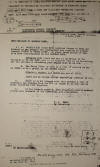
|
4 June 1928.
Drop message from Lt. W. C. Hall, Puerto
Cabezas, to Captain Rose, on patrol near
La Luz mine.
"1. A. Sandino and
Jiron with combined forces of from one
hundred to two hundred men (estimated)
are reported as moving towards POTECA on
WANKS RIVER. No other large groups of
bandits have been reported in the
EASTERN AREA. ¶ Arroliga with about six
men is operating in the vicinity of LA
LUZ MINE, and it is reported that he is
recruiting for the purpose of attacking
your supply base at LA LUZ. ¶ b. The
Wanks River is held by a line of patrols
as far as BOCAY, with a patrol up the
WASPUC River. ¶ LINSCOTT, WALKER, and
EDSON are now at BOCAY. ¶ There are no
troops within supporting distance of
you. ¶ 2. There is being dropped with
this message a list of questions and
answers from the NCO in charge at LA
LUZ; and an order regarding your
supplies. ¶ 3. If the terrain permits,
make report by pick up message giving
your estimate of the situation, and your
plans. ¶ W. C. HALL, ¶ By direction"
|
|
_small.jpg)
|
4 June 1928
(2000).
Radiogram from Major H. H. Utley, Puerto
Cabezas, to Gen. Feland, Managua.
"604 DAILY REPORT
STOP LIAISON FLIGHT TO LA LUZ COMA BOCAY
COMA WASPUC STOP PICKED UP MESSAGES AT
LA LUZ COMA LANDED AT BOCAY AND WASPUC
STOP WALKER AND EDSON IN BOCAY COMA
LINSCOTT APPROACHING BOCAY PROBABLY
ARRIVE FIFTH STOP REPORT FROM BOCAY
INDICATE AGUERRO DIED AT BOCAY MAY
TWENTY SECOND COLON SANDINO AND JIRON
JOINED FORCES NEAR CASCA AND MOVED TO
WANKS RIVER BETWEEN BOCAY AND POTECA
ARRIVING ABOUT JUNE SECOND OR THIRD NOW
MOVING UP RIVER STOP REPORTS FROM LA LUZ
INDICATE ROSE OPERATING VICINITY HIJAS
COMA ARROGILA [ARROLIGA] OPERATING
VICINITY LA LUZ WITH SIX MEN AND
ATTEMPTING TO RECRUIT MORE STOP WALKER
REPORTS LAKUS AREA PLENTIFULLY SUPPLIED
WITH ARMS AND AMMUNITION WITH
INDICATIONS OF BANDITS HIDING IN BUSH
COLON MULLER FAMILY WELL AND BEING
AFFORDED PROTECTION STOP ALL REPORTS
INDICATE NATIVES AND INDIANS SHOW FEAR
OF MARINES STOP THERE ARE TWO ENGLISHMEN
IN BOCAY STOP 2000"
|
|
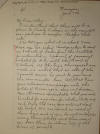
|
7 June 1928.
Letter from Buckley, Managua, to Major
H. H. Utley, Puerto Cabezas, p. 1.
"My Dear Utley: ¶
I understand that there will be a plane
to Puerto Cabezas in the near future –
perhaps tomorrow – therefore this note.
¶ I’ll tell you what it is about. Some
time ago we asked Headquarters to send
us 300 sets of books from the Institute
for instruction in Spanish of personnel
selected for duty with the Board of
Elections. At the time the request was
made we asked that 60 sets of the
Spanish course be sent to you and the
remainder here. At that time your
extensive campaign into the wilds of
Nicaragua was not foreseen. Now it seems
improbable that you will be asked for
any men for election duty and such being
the case, you will not need the books.
We are much in need of them here and if
you do not contemplate using them please
send them over if you have them buy
return trip, of the plane if possible .
. . "
|
|
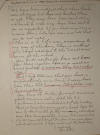
|
7 June 1928.
Letter from Buckley, Managua, to Major
H. H. Utley, Puerto Cabezas, p. 2.
" . . . we have
been notified that these books were
shipped but have not located them as
yet. They may have been sent all in one
bunch or some may have been sent to you
as requested. If you have any now or
receive them later we can use all that
you do not need. ¶ This is a h—l of a
war according to my way of thinking.
There is material for a large addition
to the ‘Small Wars’ course at the
school. ¶ Your birds certainly have cut
loose from their regular base in a most
unusual fashion. I suppose they live
native style. ¶ Red Floyd tells me that
you have a comparatively nice town. I
never have been there but I was in
Bluefields once – that is plenty. ¶ You
have us beaten for mail service and
quick communication with the U.S. ¶ You
know I was snatched out of the Scouting
Fleet at [?], just a week before we were
to start north for the summer, and
ordered down here. Consequently, I am a
bit [?] but I’ll tell you all about it
when I see you again which occasion I
hope will not be down here. ¶ Sincerely,
¶ Buckley"
|
|
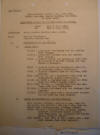
|
10 June 1928.
Operations Report and Weekly Report of
Events, 3-9 June, 1st Lt. W. C. Hall,
Puerto Cabezas, p. 1.
"Reference: Daily
reports covering same period. ¶ Maps:
Ham Map Nicaragua. ¶ Moravian Mission
Map. ¶ 1. DISPOSITION OF OUR FORCES. ¶
a. FRONT LINE. ¶ WASPUC – Lieutenant
Cunningham and one section 59th Company.
¶ AWAWAS – Lieutenant Carroll with one
section 59th Company. ¶ BOCAY – Captain
Walker and Lieutenant Taft with 48
enlisted from 59th Company and Galveston
detachment. ¶ BOCAY – Captain Linscott
with 32 enlisted, 60th Company. ¶ NEAR
SLATO de PIS PIS – Lieutenant ROSS with
reconnaissance patrol (estimated). ¶ LA
LUZ and WAUNI – Approximately – four men
from 60th Co. (Rose’s supply base). ¶
NEAR HIYAS VILLAGE. – Captain Rose with
one platoon, 60th Co., Estimated. ¶ El
GALLO – Captain Matteson with one
platoon, 51st Company. ¶ ENROUTE
BLUEFIELDS from RAMA – Lieutenant
Crawford and one section, 51st Company.
¶ b. OTHER SUPPORTING AND ADJACENT
TROOPS. ¶ WAWA CENTRAL OUTPOST NCO and 8
men, 51st. Co. ¶ RIO GRANDE BAR OUTPOST
– NCO and 7 men, 51st Co. ¶ BLUEFIELDS –
Headquarters, Southern Sector. ¶ PUERTO
CABEZAS – Headquarters, Northern Sector,
Aviation Detachment Puerto Cabezas Rear
echelons, all companies and detachments,
northern sector. ¶ PENA BLANCA – PASO
REAL DE CUA – COCAO Area – several
columns from 11th Regiment."
|
|
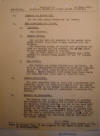
|
10 June 1928.
Operations Report and Weekly Report of
Events, 3-9 June, 1st Lt. W. C. Hall,
Puerto Cabezas, p. 2.
". . . 2. WEATHER
AND VISIBILITY ¶ Bad for both ground
troops and air forces. ¶ 3. OUR
OPERATIONS FOR PERIOD. ¶ a. CONTACTS. ¶
None reported. ¶ b. GROUND TROOPS. ¶ Our
patrols have all advanced to the points
indicated without being able to make
contact with the outlaws. ¶ All
organized groups of bandits have
retreated before the patrol, and the
Eastern Area is now clear of any
organized group of bandits. ¶ Copy of
Field Order No. 2 is attached and a drop
message to Captain Rose, marked ‘A’ and
‘B’ respectively. ¶ c. AIR FORCES. ¶ The
liaison and supply flights have
continued. On June 4, a suspicious
collection of boats and lean-tos on the
COCO River about 50 miles above BOCAY
were bombed. Report reached BOCAY later
that these boats and lean-tos were being
used by SANDINO’S men. ¶ 4. COMBAT
EFFICIENCY. ¶ The Area Commander flew to
BOCAY for a conference with Linscott,
Walker and Edson and reports that the
morale and efficiency of the troops is
excellent. The only requests made to him
were for permission to continue the
advance. ¶ 5. RESULTS OF OPERATIONS. ¶
The Eastern Area is not being disturbed
by outlaws. Our advance is now checked,
due in part to difficulty of supplying
advance patrols, and due to the fact
that the 11th Regiment patrols are about
to withdraw. The forces in the Eastern
Area occupy now, or shortly will occupy,
the general line WASPUC – WANKS RIVER –
BOCAY – PIS PIS AREA – CONCEPTION AEA –
QUNPI – RAMA, with the mission of
denying all territory east of that line
to the outlaw forces. ¶ W. C. HALL, ¶
1st. Lieut., USMC Operating Off."
|
|
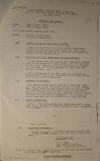
|
10 June 1928.
Intelligence Report, 3-9 June,
1st Lt. W.
C. Hall, Puerto Cabezas.
"Reference: Daily
reports same date. ¶ Maps: Ham Map of
Nicaragua. ¶ Moravian Mission Map. ¶ (A)
GENERAL STATE OF TERRITORY OCCUPIED. ¶
With the exception of a small outlaw
band under ARROLIGA in the mining area,
there have been no reports received
indicating the presence of bandits or
outlaws in the Eastern Area. ¶ (B)
ATTITUDE OF CIVIL POPULATION TOWARDS
MARINES. ¶ In the Bocay area the Indians
are apparently frightened at the
approach of our patrols, and the men
hide in the bush. However, they are
responding to friendly overtures and are
our mainstay in that area for guides,
boatmen, etc. ¶ The Nicaraguans in the
same area are reported as ‘pro-Sandino’
and no aid is expected from them; at the
most we may expect neutrality. ¶ (C)
ECONOMIC CONDITIONS. ¶ The Bragman Bluff
Lumber Company is reducing their payroll
and laying off large numbers of their
employees. About three hundred negroes
are being discharged at this time, and
no provision being made for them. There
is no other place in the vicinity of
Puerto Cabezas where they can obtain
employment. No trouble has taken place
yet, and the situation is being watched.
¶ (D) POLICE OPERATIONS. ¶ Normal. The
Commandants are being assisted in their
work by our forces, and given assistance
when it appears to be needed. ¶ [Missing
section] None reported. ¶ (F) POLITICAL
SITUATION. ¶ Nothing to report. A
LIBERAL meeting will be held in PUERTO
CABEZAS, Sunday, June 10, which will be
covered. ¶ W. C. HALL, ¶ 1st Lieut.,
U.S.M.C."
|
|

|
11 June 1928
(2000).
Radiogram from Major H. H. Utley, Puerto
Cabezas, to Gen. Feland, Managua, p. 1.
"604 DAILY REPORT
STOP LIAISON FLIGHT TO LA LUZ COMA BOCAY
COMA WASPUC STOP PICKED UP MESSAGES AT
LA LUZ COMA LANDED AT BOCAY AND WASPUC
STOP WALKER AND EDSON IN BOCAY COMA
LINSCOTT APPROACHING BOCAY PROBABLY
ARRIVE FIFTH STOP REPORT FROM BOCAY
INDICATE AGUERRO DIED AT BOCAY MAY
TWENTY SECOND COLON SANDINO AND JIRON
JOINED FORCES NEAR CASCA AND MOVED TO
WANKS RIVER BETWEEN BOCAY AND POTECA
ARRIVING ABOUT JUNE SECOND OR THIRD NOW
MOVING UP RIVER STOP REPORTS FROM LA LUZ
INDICATE ROSE OPERATING VICINITY HIJAS
COMA ARROGILA [ARROLIGA] OPERATING
VICINITY LA LUZ WITH SIX MEN AND
ATTEMPTING TO RECRUIT MORE STOP WALKER
REPORTS LAKUS AREA PLENTIFULLY SUPPLIED
WITH ARMS AND AMMUNITION WITH
INDICATIONS OF BANDITS HIDING IN BUSH
COLON MULLER FAMILY WELL AND BEING
AFFORDED PROTECTION STOP ALL REPORTS
INDICATE NATIVES AND INDIANS SHOW FEAR
OF MARINES STOP THERE ARE TWO ENGLISHMEN
IN BOCAY STOP 2000"
|
|

|
11 June 1928.
Radiogram from Major H. H. Utley, Puerto
Cabezas, to Gen. Feland, Managua, p. 2.
"COMMUNICATIONS
AND SUPPLY PRINCIPAL PROBLEMS REQUIRE
FURTHER STUDY STOP SEPARATE REPORT WILL
BE RENDERED SHORTLY STOP UTLEY"
|
|
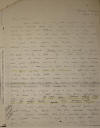
|
1.
11 June 1928.
Letter from Capt. M. A. Edson, Bocay, to
Mother, p. 1.
"Dear Mother:- ¶
Your letter of May 14th reached me by
air mail several days ago and although
for the first part of the week I have
had little enough to do my leisure time
has not been devoted to letter writing.
For the first time since landing at
Puerto Cabezas – in fact, since joining
the Denver, I am sitting around more or
less twiddling my thumbs. ¶ We reached
Bocay on the second of June. At least
some of us did for I came ahead with a
few men to take possession of it and
keep anyone else from beating us to it.
The men were twenty miles away moving by
pack trains of forty mules. We gave up
our boats at Musawas and put all our
rations on mule pack and by cutting part
of our trail through the woods, we
reached a place called Calasanki on the
first of June, eight days after leaving
Musawas. At Calasanki the trail for
Bocay suddenly stopped, so as I said
before, some of us came in by foot while
the others stayed with the mules. We
have some Indians cutting trail and the
mules should reach here tomorrow night.
¶ Friday noon, Major Utley arrived from
Puerto Cabezas by plane. Two other
captains were here too – Captain
Linscott who is a mighty fine fellow,
and Captain Walker. A couple of days
before the plane arrived, we had
received a message from the . . . "
|
|
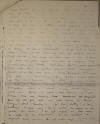
|
2.
11 June 1928.
Letter from Capt. M. A. Edson, Bocay, to
Mother, p. 2.
" . . . major
which seemed to indicate that I and my
men were to stay here at Bocay during
the next six months, or during the rainy
season. We were all glad of it for it is
not at all a bad place to stay and with
a little work fixing it up and plenty of
rations for the wet months, it would in
no time be made into a very comfortable
camp. However, when the Major came, he
gave us new information and orders. The
day before, he had received radio orders
for my transfer to the Rochester. Now
instead of staying here in Bocay, the
Denver Detachment is to go back to
Puerto Cabezas. There I will turn my men
and property over to Ralph DeWitt – the
same one who used to live in Chester,
you know and whose people now live in
Newfane [NY]. Thus I am going to Balboa,
Canal Zone on the first government ship
and then on another ship to Corinto,
Nicaragua. Corinto is on the west coast.
There I report at Managua for duty as
commanding officer of the Marine
detachment of the USS Rochester. The
latest information I have is that the
Rochester Marines are somewhere around
Matagalpa which is almost as far inland
from Corinto as Bocay is from Cape
Gracias or Puerto Cabezas. We are
leaving here tomorrow at daylight and if
all goes well we will arrive in Puerto
Cabezas about Sunday. So the letter is
being written to you now to be mailed as
soon as we reach the coast. I do not
expect to have time to write on the trip
down, for we breakfast at daylight each
morning – get under way by six and . . .
"
|
|
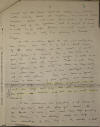
|
3.
11 June 1928.
Letter from Capt. M. A. Edson, Bocay, to
Mother, p. 3.
" . . . except for
six hours halt at noon, we move until
nearly dark at night. We should make
Waspuc, some 200 miles downriver, in
three days, and if the gasoline boat I
expect is there, we will be in Cape
Gracias the next night. It is then only
a half days journey to Puerto Cabezas. ¶
It will be rather good to get into
civilization once more, even though it
is but a short time. If I were staying
on this coast, I would much prefer to
remain here in the bush to going in to
the Port for a couple of weeks or so and
then back out again. This is not the
best place in the world to live, by any
means, but when one is more or less
stabilized, it is not too bad, either.
Here we have a good house to live in, a
good galley, and enough food to keep us.
The place is fenced, too, so that the
hogs and pigs are not running under the
table or around our bed as in most
Indian houses. ¶ I am wondering how
everything is at home – where you are
and the plans you have. If you decide to
move, and need any help financing the
change, I am always ready to help. One
advantage of this life in the country is
that . . . "
|
|
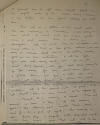
|
4.
11 June 1928.
Letter from Capt. M. A. Edson,
Bocay, to
Mother, p. 4.
" . . . it permits
one to get some slight start on the
right side of the books since there is
so little one can spend money for out
here. ¶ There will be a letter in the
mail with this one addressed to [?]. I
am sorry to hear about the school work
for I am quite sure I could secure him a
chance for Annapolis, but he would have
to compete with many others. That is one
place where no one cares or worries
about one – he either makes good on his
own initiative or out he goes. You need
not worry about him, for he has lived
long enough with you and had never to go
far wrong. You two could never have a
person living near you or with you who
would not have learned to follow the
right path more than the wrong. We will
make mistakes, but if the ground work is
good, I do not think there is ever much
to be afraid of. ¶ Tonight it is raining
as usual. The wet season is here to
stay. If the morning is good, the
evening and night brings rain – and if
it is good at night – the morning is
bad. Some days I expect, both day and
night will bring rain and that will not
be so . . . "
|
|
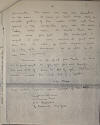
|
5.
11 June 1928.
Letter from Capt. M. A. Edson,
Bocay, to
Mother, p. 5.
" . . . placement.
The rivers here are very sensitive to
the rain. It rains so hard that only a
small portion of the water soaks into
the ground – the remainder going into
the rivers. Today since noon, the Wanks
River has risen some four feet. By
midnight I expect it will have reached
its peak and from there on will go down
again, and by day after tomorrow be as
low as it was this morning. ¶ Tomorrow
we get up a four thirty so here is a
good night to you and Dad and Grandpa.
Lots and lots of love to all of you
Mother o' mine until the next bit of a
letter. ¶ Merritt ¶ New address
beginning upon receipt of this letter:-
¶ Captain Edson ¶ U.S. Marine Corps ¶
USS Rochester ¶ c/o Postmaster, New
York"
|
|
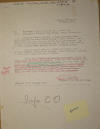
|
12 June 1928.
Report from Capt. H. D. Linscott, Bocay,
to Major H. H. Utley, Puerto Cabezas.
"1. Sergeant
Mosier arrived at 1430 yesterday with
the eight hundred and sixty (860)
rations (money value). This means much
more than that in actual days
subsistence. He brought four Fifty-ninth
Company men to remain here, making a
total of seven here pending Captain
WALKER’s return. ¶ Captain EDSON with
his entire detachment less Private
CARROLL, Fifty-first Company, radio
operator, cleared at 6:30 a.m., today
enroute to WASPUC. ¶ Still have MARINES
and natives out cutting trail to bring
mules down from KALASONIKI. Effected
them tomorrow, but heavy rains and
swollen creeks may delay them two days.
All quiet here, Indians returning from
bush, and quite friendly. Have commenced
barracks for housing of command here.
Will require one hundred dollars
($100.00) additional funds. EDSON had
none and I assumed bills for his
attachment."
|
|

|
14 June 1928
(0800).
Radiogram from Capt. Tebbs, Pis Pis
patrol, to Major H. H. Utley, Puerto
Cabezas.
"From: C.O. Pis
Pis Patrol. Eden Mine. ¶ To: Commander,
Eastern Area, Nicaragua. ¶ 8614
Following received from G. A. Napoleon,
Manager of Neptune Mine quote Yesterday
afternoon Ramon Lajos of Limon was over
here. He told me that four days ago, one
of Arroliga's troops was in Limon, and
told a woman friend of his to get out of
town as any time after the 15th of the
present month they would be coming to
this district. I am sending this by
messenger as I want to keep you informed
of all rumors going around unquote.
Numerous runners in this area of late
Stop Will move patrol to Neptune
tomorrow and if rumors do not appear
serious after investigation I will start
for Waspuc as soon as boats are
available stop 0800 Tebbs"
|
|

|
13 June 1928
(0845).
Radiogram from Capt. Tebbs, Pis Pis
patrol, to Major H. H. Utley, Puerto
Cabezas.
"From: C.O Pis Pis
Patrol. ¶ To: Commander, Eastern Area,
Nicaragua ¶ 8613 Hope to be able to get
underway for Waspuc tomorrow stop Am
expecting boats any day now at Big Falls
Stop All reports sent by sick men by
supply route Stop The report of Hanson's
is the second I have received about
bandits in that vicinity Stop I sent
trusted scout to investigate (Spic) but
was unable to locate any the first time
Stop ¶ TEBBS 0845"
|
|
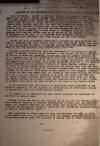
|
14 June 1928.
A Resume of the Situation from about
March 28, 1928 to May 13, 1928,
author
unknown (probably Major H. H. Utley,
Puerto Cabezas), p. 1.
"About 28 March,
bandits in several columns left Eastern
Segovia. A small band of about twenty
raided Sang Sang and Awasbila on 5-6
April. The other columns under Giron and
Altimarano went south, skirted Jinotega,
moved east and about 3 April reached the
area Tuma-Coyalar. Another column under
Sanchez came from the west and joined
the others in the same area or possibly
farther east. This band stayed in that
area for several days and reports
received and deductions made seem to
indicate that they were attempting to
move south or southeast with the idea of
getting into the rich coffee area or of
moving to the general vicinity of
Matiguas or Muy Muy. It is believed that
energetic patrolling at that particular
time prevented them from moving the way
they wished. ¶ During the stay
apparently additional instructions were
received for them to proceed east to the
mining area. From about 11-16 April they
were in the La Luz-Pis Pis area. La Luz
was visited the 12th and the Neptune
Mine of the Pis Pis group was visited
about the 17th. ¶ Reports received
indicate that the employees of the mines
had opportunity to escape, if they had
so desired. A few stayed and were
captured. As far as is known Mr.
Marshall is the only one at present
missing and it is assumed that he is a
captive of the force which visited that
area. After taking what they could in
the way of money, merchandise and
animals, and after doing some damage,
this group estimated from 150 to 175
bandits moved northwest to the general
vicinity of Casas Viejas. Another group
of about 60 bandits under Irias moved
into the mining area from the west about
the 26th and from reports received
(unconfirmed) did some additional damage
to the mines. This group either stayed
in that general vicinity or moved out
and then moved back in. Probable they
were waiting for boats for about the 1st
they did attempt to go down the Waspuc
and were met by Captain Edson’s patrol.
They were driven back south, were met
again and driven farther back south.
These two contacts were on 4 and 6
April. At present this group has been
forced to the west up the Guabul River.
¶ It is believed that this series of
operations were conducted by the bandits
primarily for the purpose of
intercepting or receiving a supply of
ammunition, and that their mission
failed. ¶ At present it is believed the
main bandit strength is northwest of the
Pis Pis mining area. ¶ Ground troops are
now in the vicinity of La Luz and the
Neptune Mines and authentic reports on
bandits depredations in that area are
expected daily. All reports received are
from other than military sources except
Aviation reconnaissance reports, which
are not considered accurate enough to
make an authoritative report. ¶ The
situation in other areas is very
satisfactory and well in hand. A few
small bands are at large but they are
rapidly disintegrating. We are giving
them no rest and continue to harass them
at every opportunity. . . . "
|
|
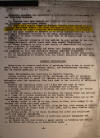
|
14 June 1928.
A Resume of the Situation from about
March 28, 1928 to May 13, 1928,
author
unknown (probably Major H. H. Utley,
Puerto Cabezas), p. 2.
". . . Generally
speaking the situation is considered
very satisfactory for the following
reasons: ¶ (1) Bandits have been denied
all towns of any importance, and also
the important agricultural areas. ¶ (2)
Their main supply bases in Eastern
Segovia were almost if not entirely
destroyed during the first ten days of
April. Approximately 125,000 pounds of
bandit supplies were destroyed during
that period. ¶ (3) His main concern at
present is to avoid contact with us, and
his activities therefore confined to the
wild, mountainous areas. ¶ (4) There is
ample evidence to show that he is losing
some of his men by desertions. ¶ (5) The
repeated attempts of the bandits to gain
access to the rich Jinotega-Matagalpa
coffee areas have been easily
frustrated. ¶ (6) Enemy attempts to gain
a new supply of ammunition are believed
to have resulted in failures. ¶ (7)
Evidence is increasing and shows that
Sandino is rapidly losing his prestige
in this and contiguous Central American
countries. ¶ (8) We are rapidly building
up confidence in the native population.
¶ (9) In conclusion we believe that the
bandit situation is very close to
normal. ¶
PRESENT
DISPOSITIONS ¶
Operations at present exclusive of
measures being taken to round up small
bands in Segovia, Northern Esteli, and
Northwestern Jinotega, may be stated
generally as follows: ¶ Small
detachments are opterating in Eastern
Segovia. ¶ Strong patrols are working
north, northeast, and east of Jinotega.
¶ Patrols designed to guard the eastern
approaches to the Jinotega-Matagalpa
area are operating from that area to the
vicinity of Matiguas-Guapotal. ¶ Patrols
are operating north out of Muy Muy and
east to Saiz. ¶ Patrols are operating
north and northeast out of Boaco. ¶ A
patrol opposite Awawas is blocking the
Coco River and the trails to the north.
¶ A patrol at Waspuc (Bucbuc) is
blocking the Waspuc River and serving as
a base for a patrol operating up the
Waspuc River. ¶ A strong patrol has gone
all the way up the Waspuc River and is
now working up the Duabul River. ¶ A
strong patrol is now in or very close to
Eden, with orders to reinforce the above
mentioned patrol. ¶ A strong patrol is
now in or very close to La Luz, with
orders to investigate and report on
bandit acts in that area, and to deny
bandits entrance to that vicinity. ¶ A
strong patrol is at El Gallo blocking
the river and trails and operating
against smugglers. ¶ At Rio Grande a
small patrol is operating against
smugglers and blocking the river. ¶ At
Saclin on the Coco River, a small patrol
is blocking the trails to the north and
acting as an observation post."
|
|
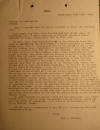
|
14 June 1928.
Message from Jefe
Político Juan J. Estrada, Bluefields, to Minister of
Gobernación, Managua, with official
report from Police Commander in Siuna,
April 12-30.
"Today I received
from the Police Commander in Siuna the
following note: ¶ ‘Alamicamba, May 30th,
1928: Mr. Jefe Politico of the Dept., of
Bluefields, Sir:- I beg to send you my
official report, as Police Commander of
Siuna, during April 18th to 30th, 1st. ¶
On April 12th, last about 5 o’clock in
the afternoon Siuna was taken by
surprise by the rebel Sandino’s forces
commanded by General Manuel Maria Jiron
R., having left part of his forces in
the La Luz and Los Angeles Mine.
Immediately I was deprived on my pistol
and obliged to provide with food part of
the soldiers. About eleven at night in
spite of their already having taken
provisions and other things by force,
they broke open the Chinese stores Wing
Kong and Allena Chow and looted them and
then started to drink. On the 13th
started violating individual’s homes,
pretending to look for arms, robbing all
they found of any value. On the same
date, after the looting, they left in
the direction of the Neptune Mine,
saying that 180 men were on their way
without commander. On the 16h of the
same month I heard of the coming of some
forces and therefore was obliged to look
for hiding the mountains with my family.
On April 24th I had news of the arrival
of a Colonel Carlos Aguero, who set on
fire the La Luz and Los Angeles Mine, 25
cases of dynamite having blown up in the
said mine. On the 27th of the same month
General Augusto C. Sandino himself
arrived there, who finished up my little
store as well as some other things of my
personal use. And afterwards he
proceeded to loot all the Chinese stores
destroying t hem, and saying that the
Chinese in question had gone to get the
American Marines, along with Mr.
Amphlett of the La Luz Mine. As per
reports I have received the commissary
was destroyed as well as the Manager’s
house and the warehouse in the mine. I
was also informed that on the 13th April
Mr. Marshall, American citizen and
acting superintendent of the mine was
made prisoner by the forces of General
Jiron. ¶ Mr. Jefe Politico the excuse I
have for not having sent this report
before is that I had to cross the
mountain with my family, coming out near
the plains of Alamacamba. With shows of
my consideration, I am yours, Narciso
Choza.’ ¶ All the above I communicate to
you for your information and other
consequent effects. ¶ Yours, ¶ JUAN J.
ESTRADA."
|
|
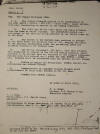
|
15 June 1928.
Field Order No. 3,
Capt. M. A. Edson
(Bocay?) to command.
"Map: Ham map of
Nicaragua 1924. ¶ 1. A. The outlaw
strength appears to be concentrated in
the area BOCAY – POTECA – STA CRUZ –
CERRO HIYAS. Local robbers have been
threatening to operate in the mining
districts. ¶ b. The WANKS and WASPUC
River areas are being patrolled from the
base of WASPUC VILLAGE. The CONCEPCION
mining area and routes to the west are
being patrolled by our forces based on
LA LUZ MINE. ¶ 2. Our forces in the
Eastern Area continue to advance up the
WANKS River and westward from LA LUZ,
denying territory to the bandits,
maintaining order and protecting lives
and property throughout the Eastern
Area. ¶ 3. The Marine Detachment, USS
Tulsa, less rear echelon, will establish
an outpost in the PIS PIS mining
district, exact location to be decided
upon and reported by the outpost
commander. Patrols from this outpost
shall cover the area YAPUWA – TUNKY –
ASA. Liaison shall be maintained with
our patrols on both flanks. ¶ 4. Routes
of supply and evacuation: PUERTO CABEZAS
via PRINZAPOLKA and BAMBANA Rivers. ¶ 5.
Communication by airplane liaison
flights until establishment of field
radio station in PIS PIS area. ¶ Command
Post PUERTO CABEZAS. ¶ BY ORDER OF MAJOR
UTLEY, ¶ Captain, U.S. Marine Corps, ¶
Executive Officer."
|
|
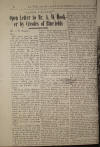
|
15 June 1928.
La Voz del
Atlántico, Bluefields,
"Open Letter to Mr. A. W. Hooker by
Creoles of Bluefields,"
p. 1.
[SUMMARY:
A vitriolic denunciation of the
publisher of the Bluefields Weekly,
by unidentified "Creoles of Bluefields"
who accuse Hooker of "vile and malicious
attempt to set the Government of
Nicaragua . . . against us."]
|
|
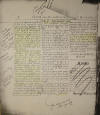
|
15 June 1928.
La Voz del
Atlántico,
Bluefields, "Open Letter to Mr. A. W. Hooker by
Creoles of Bluefields,"
p. 2.
|
|
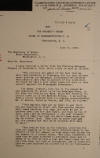
|
15 June 1928.
Letter re Freiberg Mahogany Co. from
Rep. N. Longworth, Wash. D.C., to Sec.
State, Wash. D.C., p. 1.
"I have received a
letter from the Freiberg Mahogany
Company of Cincinnati, Ohio, which reads
in part as follows: ¶ “You probably are
aware of the fact that we have been
operating in Nicaragua for the last
fifteen years getting out mahogany;
furthermore we suffered very heavily
last year on account of the revolution
for which we have a very large claim (of
more or less value?) against the
Nicaraguan Government. ¶ “It seems,
however, that one of the places we are
operating in, which is on the Kukalaya
River, is not very far from La Luz Mine,
which was recently reported blown up by
the Sandino Forces. I am quoting from a
letter received from our logging
superintendent, dated at Wounta, May
17th, as follows: 'The Marines take all
my boats to get their men and supplies
up river, and then another detachment
comes marching thru camp just when we
get it quieted down from the last bunch,
and then on top of that, they take my
provisions--the last shipment of lard to
camp they took the whole blame works and
let me without lard. They take my motor
boat and all the pitpans and tell me my
business will have to wait.’ ¶ “You
realize that in the tropical countries
the time for logging is of but short
duration owing to the brevity of the dry
season, so that every day during the dry
season is of utmost value. The loss,
therefore, of time that we have suffered
is extremely heavy and it seems to us
that we have a just and legal claim for
not only the time, but loss of
provisions, use of boats, etc. that we
have suffered as pointed out by our
representative. . . . "
|
|
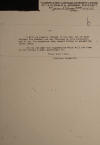
|
15 June 1928.
Letter re Freiberg Mahogany Co. from
Rep. N. Longworth, Wash. D.C., to Sec.
State, Wash. D.C., p. 2.
". . . I will be
greatly obliged if you will let me know
whether the Company has any recourse in
this situation, and if so, the procedure
they should follow in presenting their
claim. ¶ If you can make any suggestions
which will aid them in the future I
shall appreciate it."
|
|
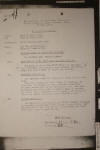
|
17 June 1928.
Intelligence Report, 10-16 June,
1st Lt.
W. C. Hall, Puerto Cabezas, p. 1.
"FROM: 0000 10
June, 1928. ¶ TO: 2400 16 June, 1928. ¶
Reference: Daily reports same date. ¶
Maps: Ham Map of Nicaragua. ¶ Moravian
Mission Map. ¶ (A)
GENERAL STATE OF
TERRITORY OCCUPIED. ¶ The Eastern
Area remains quiet. ¶ (B)
ATTITUDE OF CIVIL
POPULATION TOWARDS MARINES. ¶ The
Indians along the WANKS River are
becoming more friendly; they require
very careful treatment; otherwise they
refuse to assist our patrols. ¶ (C)
ECONOMIC
CONDITIONS. ¶ The economic
condition along the coast remains the
same. ¶ Condition along the WANKS River
is returning to normalcy. No report has
been received regarding economic
conditions in the CONCEPCION area, but
preparations are being made at NEPTUNE
MINE to re-open the mine. It is reported
that laborers are being offered one
dollar and sixty cents ($1.60) a day. ¶
(D) POLICE
OPERATION. ¶ The Police in the
vicinity of Puerto Cabezas continue to
function, performing their duties fairly
well. The Commandante at WAWA BAR is not
satisfactory and steps are being taken
to replace him. . . ."
|
|
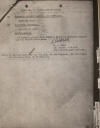
|
17 June 1928.
Intelligence Report, 10-16 June,
1st Lt.
W. C. Hall, Puerto Cabezas, p. 2.
" . . . (E)
FRICTION BETWEEN
MARINES AND CIVILIANS. ¶ None
reported. ¶ (F)
POLITICAL SITUATION. ¶ Nothing to
report. ¶
MISCELLANEOUS. ¶ A special report
from Captain Edson is attached regarding
the WASPUC-BOCAY Area."
|
|
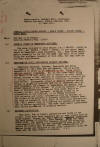
|
17 June 1928.
Special Intelligence Report, Wanks River
- Waspuc River - Bocay Area,
Capt. M. A.
Edson, Puerto Cabezas, p. 1.
"Maps: Ham Map of
Nicaragua. ¶ Moravion Mission Map.
(1919) ¶ (a)
GENERAL STATE OF TERRITORY OCCUPIED.
¶ The area included in this report
i.e.:- WASPUC - SALTO de PIS PIS - RIO
HAMACA - BOCAY - AWAWAS, is now quiet.
Small bands of deserters, camp
followers, etc., from those bandit
groups formerly in the PIS PIS AREA are
still to be found along the southern
boundary of this area, but they have no
military significance. ¶ (b)
ATTITUDE OF CIVIL
POPULATION TOWARDS MARINES. ¶
Generally friendly. Indians, Spaniards
and white foreigners in this area are
pro-Sandino, but no active opposition is
shown to or expected by us. These people
require careful treatment. All of the
inhabitants along the WANKS RIVER have
given aid to Sandino or other bands,
either through actual coercion or
constructive coercion due to living in
territory heretofore virtually
controlled by such forces. Propaganda
spread by Aguerro against Marine forces
is generally believed and can be
combatted only by good treatment, an
attempt to understand the people, and
actual example of our forces. If
properly handled, a great deal of
assistance may be expected from these
people as boatmen, guides, and laborers.
Although little or no information is now
obtained, it is firmly believed that
valuable and timely information will be
secured in the future if we maintain a
friendly attitude towards them. Any sign
of oppression, poor faith in fulfilling
obligations, etc., will result only in
hindering our operations and may lead to
active opposition. The more intelligent
inhabitants will become pro-Marine if
properly handled. ¶ (c)
ECONOMIC
CONDITIONS. ¶ Very poor. Due to
bandit operations and those of our
forces, crops have been neglected and in
some places food is quite scarce. Around
the BOCAY AREA all mahogany operations
the main source of revenue, have ceased.
Along the lower WANKS RIVER, the banana
bit industry helped the situation
considerably but that has not increased
as much as was expected two months ago.
At present, the transportation of Marine
troops and supplies is the chief
occupation along the river and the main
source of revenue. . . ."
|
|
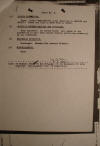
|
17 June 1928.
Special Intelligence Report, Wanks River
- Waspuc River - Bocay Area,
Capt. M. A.
Edson, Puerto Cabezas, p. 2.
" . . . (d)
POLICE OPERATIONS.
¶ None. Local Commandantes still
function in SACKLIN and WASPUC. There
are none in SANG SANG or BOCAY. ¶ (e)
FRICTION BETWEEN MARINES AND CIVILIANS.
¶ None reported. As stated above, this
phase of our operations in this area
should receive particular attention by
all concerned. ¶ (f) POLICE SITUATION. ¶
Unchanged. Ninety-five percent Liberal.
¶ (g)
MISCELLANEOUS. ¶ None."
|
|
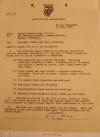
|
18 June 1928.
Damage done at La Luz by bandits,
1st Lt. W. C.
Hall, for and in the absence of Capt.
Herbert Rose, USMC, La Luz, to Gen.
Feland, Managua.
"1. The following
report based on my personal observation
and such technical information as I was
able to obtain regarding damage done at
La Luz by bandits is submitted: ¶ (a)
Mill dynamited and contents destroyed.
Principle machinery contained in same -
3 Harding mills, 10 stamps, ice machine,
3 gasoline motors, lathe, water wheel
and many tools. ¶ (b) Retort house and
assay office - contents ruthlessly
destroyed. Principle contents - scales,
ovens, crucibles and acids. ¶ (c) Six
cyanide tanks dynamited and destroyed. ¶
(d) Commissary burned and destroyed. ¶
(e) Superintendents house burned and
destroyed. ¶ (f) Assistant
Superintendents house burned and
destroyed. ¶ 2. Everything of value in
the line of food, clothing, tools, etc.,
that could possibly be taken was carried
away by the bandits. This statement is
based on many reports from inhabitants
of this area. ¶ 3. The mine cars, track
and water line are intact. There are
remaining on the mine property eight
small frame buildings and six native
houses."
|
|

|
18 June 1928
(1435).
Radiogram from Major H. H. Utley, Puerto
Cabezas, to Gen. Feland, Managua.
"8618 LIEUTENANT
CONWAY REPORTS AS FOLLOWS QUOTE WAS
FOLLOWING CAPTAIN HOWARD STOP HE WENT
INTO STORM DIRECTLY OVER WANKS RIVER
ABOUT TWELVE HUNDRED THE FOURTEENTH STOP
SPENT OVER HALF HOUR LOOKING FOR HIM
THEN FLEW THROUGH STORM TO THE COAST
STOP RAN OUT OF GAS AT FIFTEEN FIFTEEN
AND MADE FORCED LANDING TEN MILES SOUTH
OF MOUTH OF PATUCA RIVER STOP LEFT
NATIVE GUARDING PLANE AND PROCEEDED ON
FOOT WITH MECHANIC PRIVATE CHARLES W
CHAMBERS JUNIOR TO CAPE GRACIAS A DIOS
SIGNED CONWAY UNQUOTE STOP 1435"
|
|
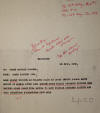
|
18 June 1928
(2015).
Radiogram from Major H. H. Utley, Puerto
Cabezas, to Gen. Feland, Managua.
"8616 CONWAY
REPORTS AS FOLLOWS COLON AT LEAST TWELVE
LOADED RAFTS MOVING UP PATUCA RIVER COMA
PATUCA RIVER VALLEY SPARSELY SETTLED
COMA NATIVES ALONG COAST FROM PATUCA TO
CAPE GRACIAS APPEARED HOSTILE AND CALL
THEMSELVES NICARAGUANS STOP 2015"
|
|
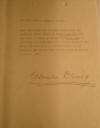
|
27 June 1928
(1000).
Radiogram on Lt. Uriza, Eastern Area,
contact with rear guard of Pedro
Altamirano's forces 27 June near Piedra
Luna.
"HOT STUFF FROM
THE PUBLICITY SECTION ¶ 8627 LIEUT URIZA
AND CONSUELO GUARDIA PATROL HAD CONTACT
AT ELEVEN HUNDRED ON TWENTY SEVEN JUNE
WITH REAR GUARD OF PEDRON ALTAMIRANO
NEAR PIEDRA LUNA TWO EIGHT ZERO DASH
THREE ZERO SEVEN BANDIT CASUALTIES ONE
KILLED AND INDICATIONS OF SEVERAL
WOUNDED GUARDIA CASUALTIES ONE WOUNDED
THREE GUARDIA PATROL IN PURSUIT OF
BANDITS 1000"
|
|
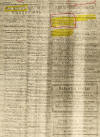
|
28 June 1928.
The Bluefields Weekly. "Our Marines Must Guard Nicaraguans"
... "Puerto Cabezas Notes"
"According to
information received, about one thousand
men have been discharged as a result of
a new plan adopted by the Bragmans Bluff
Lumber Co., though it is stated this
wholesale reduction of hands is due to
lack of work. A circular issued by
the new manager, Mr. McKay, instructs
that all jobs or employment to be given
out or filled must exclusively be to
sons of the soil."
|
|
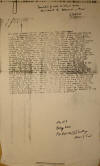
|
28 June 1928.
Letter from Enrique Gulke, Jinotega, to
Jefe Político, Jinotega.
"Mr. Jefe Politico
of the Department – City (Jinotega) ¶
‘I, Enrique Gulcke, 48 years old,
married, merchant and factory owner,
German subject, and living in this City,
place before your authority the
following complaint: on the 31st of May,
Sandinistas, well armed, commanded by
Pedro Altamirano, alias called Pedron,
came to my lumber cutting encampment
which I have legally established about 8
miles from the mouth of the Poteca
River. They took everything there was,
such as merchandise, provisions, and
utensils, and they threatened with death
my manager, Enrique Pineda, who arrived
here yesterday to give us the above
report and to whom they stated that
nobody, either foreigner or Nicaraguan,
could cut down a tree without the
express permission of General Augusto C.
Sandino, because of this threat and
owing to the fact that they were
despieled of everything they had, Pineda
and all my workers left my place, where
I had stopped work since last November
due to threats made by Sandino in a note
he sent along with a decree dated Nov.
14 wherein he demanded forestry as well
as export tax. Of course I did comply
and had to stop my works, referring the
note and decree, which I now have in my
possession, to the Minister of
Government, the high Command, and the
Legation of the United States in
Managua. Now I had reports about Sandino
and his troops having left for the
Atlantic Coast at the beginning of April
and, supposing that he would never come
back, I decided to start work again, as
intensively as possible because the
paralyzation of said work had already
caused various losses to me. Taking out
of lumber can be done at a reasonable
cost in the dry season and only in
places where it is utterly impossible to
work in the rainy season because the
ground turns completely into mud. Now,
with what has happened to me, I have
been obliged to abandon my enterprise
for I don’t know how long; until I can
get full guarantees. I shall present my
claims for damages to the proper
authorities. Jinotega, June 12, 1928. E.
GULCKE."
|
|
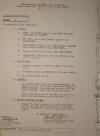
|
29 June 1928.
Administrative Orders No. 4,
Capt. M. A.
Edson, Puerto Cabezas.
"To accompany
Field Order No. 4. ¶ 1. SUPPLY. ¶ a.
COCO, and WANKS Patrol (less CAPE
GRACIAS) from dump at WASPUC. ¶ b. PIS
PIS Patrol from PUERTO CABEZAS via
PRINZAPOLKA. ¶ c. PRINZAPOLKA Patrol
(less PRINZAPLOKA VILLAGE) from PUERTO
CABEZAS via PRINZAPOLKA. ¶ d. Troops in
Southern Sector from BLUEFIELDS. ¶ e.
PRINZAPOLKA (VILLAGE) and CAPE GRACIAS
from PUERTO CABEZAS. ¶ 2. EVACUATION. ¶
a. Northern Sector to PUERTO CABEZAS via
river route. ¶ b. Southern Sector to
BLUEFIELDS via river route. ¶ c.
Emergency cases by air. ¶ 3. REPORTS. ¶
All patrols and posts will submit
weekly, to Sector CP, for the period
from 0000 Sunday to 2400 Saturday a
consolidated report covering first,
second, third and fourth sections. ¶
These reports to be in addition to those
required by Administrative Orders Number
1. ¶ 4. SUPPLY FLOTILLA GUARDS. ¶ Supply
Flotilla guards will accompany boats
forward to next post only where new
guards will be furnished. Guards return
when boats return. ¶ BY ORDER OF MAJOR
UTLEY: ¶ MERRITT A. EDSON ¶ Captain,
U.S. Marine Corps, ¶ Executive
Director."
|
|
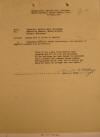
|
29 June 1928.
Damage done at La Luz by bandits,
Major
H. H. Utley, Puerto Cabezas, to Gen.
Feland, Managua.
"Subject: Damage
done at La Luz by bandits. ¶ 1.
Complying with your verbal instructions,
the substance of Amphett's remarks were
as follows:- ¶ "That it was a good thing
Sandino used dynamite and did not burn
the buildings. If the buildings had been
burned the machinery would probably have
damaged beyond repair. The explosion
ruined some, but he thought the majority
could be salvaged and used again." ¶
[signed] HAROLD H. UTLEY"
|
|
|
|
|
PREVIOUS
NEXT
|
|
|
|
|
|
|
|
